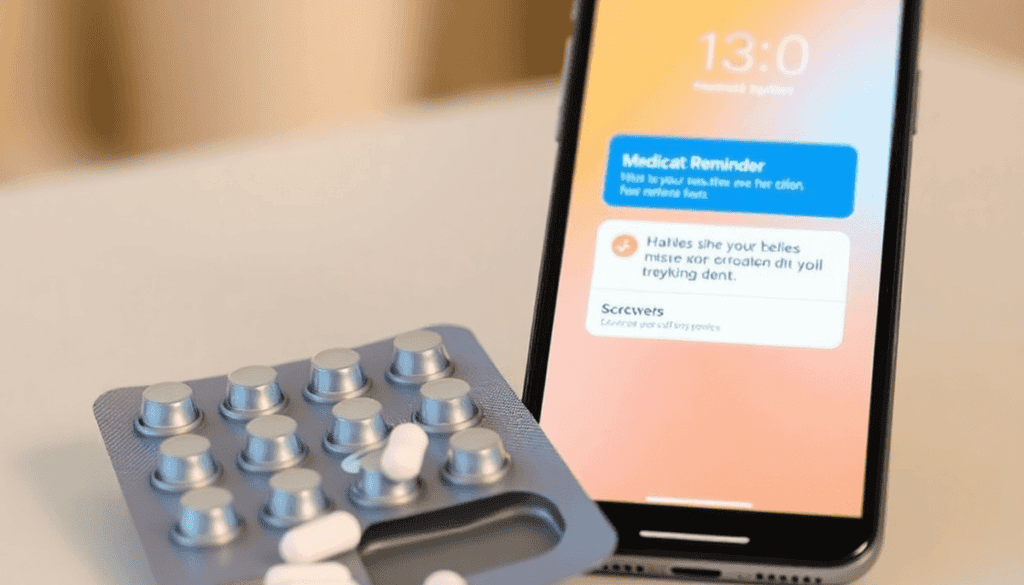What Happens When You Miss a Dose? Expert Advice from Pharmacists
Taking medication exactly as prescribed is not just a suggestion—it’s the cornerstone of effective treatment. A missed medication dose can throw a wrench into your health plan, leading to less-than-stellar outcomes or even unwanted side effects.
Why Do Doses Get Missed?
Reasons for missing doses? They range from the usual suspects like busy schedules and forgetfulness to more complex issues such as side effects or confusion about instructions. Sometimes life just gets in the way.
The Consequences of Missing Doses
What happens when you miss a dose? The impact varies: skipping a pill here and there might not spell disaster, but consistent misses can reduce a medication’s effectiveness and jeopardize your health goals. Pharmacist advice is clear: understanding how to handle missed doses keeps your treatment on track and helps avoid complications.
This guide dives into expert tips on managing missed doses, boosting medication adherence, and making sure you get the most out of your meds without the guesswork.
Understanding the Consequences of Missing a Dose
Missing a dose can feel like a small slip, but its missed dose effects can ripple through your treatment plan. The most obvious impact? Reduced treatment effectiveness. Medications are designed to maintain a certain level in your bloodstream. Skip a dose, and that level dips, which can blunt the medication’s intended action. Think of it as trying to keep a campfire burning—you need to add wood regularly or the fire fizzles out.
Dosing isn’t just about taking pills on time; it’s about keeping balance. When doses are missed, some patients might be tempted to double up later to “catch up.” That’s where the side effects risk kicks in. Taking two doses too close together can overwhelm your system. Side effects that were mild or manageable at normal doses may become severe or even dangerous when concentrations spike unexpectedly.
The consequences don’t wear a one-size-fits-all hat; they vary depending on medication type and timing:
- Short half-life drugs (like certain antiseizure meds) lose effectiveness quickly if a dose is missed.
- Long half-life drugs (like some blood pressure meds) might tolerate occasional delays better.
- Timing matters too—missing a dose right before the next scheduled one often means it’s safer to skip rather than double up.
Understanding these nuances helps prevent unintended complications and keeps your treatment on track without unnecessary risks.
General Guidelines from Pharmacists for Missed Doses
When it comes to missed doses, pharmacists offer valuable guidance to help patients navigate the situation effectively. Here are some general guidelines and recommendations to keep in mind:
- Actions for a dose less than 2 hours late: If you realize you’ve missed a dose by less than 2 hours, it’s usually safe to take it. No need to stress about meal timings unless there’s a risk of severe side effects.
- Dealing with once or twice daily medications more than 2 hours late: In the case of medications taken once or twice daily, if you’re over 2 hours late for a dose, take it as soon as you remember—unless the next dose is around the corner.
- Advice for medications taken multiple times daily: For medications requiring more frequent intake throughout the day, skipping the missed dose and waiting for the next scheduled one is typically advised.
These simple yet crucial steps can help maintain treatment effectiveness and minimize the chances of experiencing unwanted side effects due to missed doses. By following these guidelines provided by pharmacists, patients can ensure they stay on track with their medication regimen for optimal health outcomes.
Why You Should Never Double Up on Missed Doses
Doubling up to catch up sounds tempting, but it’s a fast track to trouble. Double dosing risks include:
- Overdose symptoms: nausea, dizziness, heart palpitations, or even serious toxicity depending on the medication.
- Increased side effects: some drugs become harsher on your liver, kidneys, or stomach when taken in higher amounts suddenly.
- Complicated treatment: doubling doses can throw off your medication levels, making it harder for your body to stabilize.
Take blood pressure meds as an example. Doubling could cause dangerously low blood pressure or fainting spells. For painkillers like opioids, a double dose ups the risk of respiratory depression—definitely not something you want.
Pharmacists stress overdose prevention by sticking to prescribed doses and following specific missed dose instructions. When in doubt, skip the extra pill and consult your pharmacist instead.
This approach keeps treatment effective and side effects manageable — a smarter move than playing dose catch-up.
Specific Advice for High-Risk Medications
Antiseizure medications
If a dose is missed, the general advice is to take it within 6 hours of the scheduled time. If more than 6 hours have passed, it might be best to skip that dose. However, it’s crucial to consult your healthcare provider for specific guidance based on the type of antiseizure medication you are taking.
Oral contraceptives
The guidelines for missed doses can vary depending on the type of pill. It’s essential to carefully read the instructions that come with your specific oral contraceptive. Generally, if you miss a dose, take it as soon as you remember and continue with your regular schedule. Backup contraception may be necessary if multiple doses are missed.
Methotrexate (weekly)
There is a strict no double-dose policy for methotrexate. If a dose is forgotten and it has been more than 3 days since the missed dose, skip it and wait until the next scheduled dose. Consult your healthcare provider for further advice.
Warfarin
Patients taking warfarin should always follow the guidance provided by their healthcare provider or anticoagulant records regarding missed doses. Warfarin dosing is crucial for maintaining the right level of anticoagulation and preventing complications. Any missed doses should be addressed promptly to avoid potential risks.
Antiseizure Medications and Other Drug Interactions
When managing antiseizure medications, it’s important to note that they can interact with other drugs, including oral contraceptives and even certain migraine medications. Always inform your healthcare provider about all medications you’re currently taking to avoid harmful interactions.
Remember, each high-risk medication has specific considerations when it comes to managing missed doses or potential drug interactions. Always seek guidance from your healthcare provider or pharmacist to ensure safe and effective treatment.
Role of Patient Information Leaflets and Professional Consultation in Managing Missed Doses Effectively
Importance of Reading PILs for Medication-Specific Instructions After Missing a Dose
Patient Information Leaflets (PILs) contain crucial details on what to do if a dose is missed. Specific instructions tailored to each medication can guide patients on the next steps to take. Reading the PIL ensures accurate and safe management of missed doses, minimizing risks.
When to Seek Advice from Pharmacists or Healthcare Providers
If unsure about how to proceed after missing a dose, consulting a pharmacist is recommended. Pharmacists can provide personalized guidance based on the specific medication and individual circumstances. Healthcare providers can offer further insights and address any concerns regarding missed doses promptly.
Strategies to Improve Medication Adherence and Prevent Missed Doses in the First Place
Missing doses happens, but you can stack the odds in your favour with the right medication adherence tools. Here’s how to keep your meds on track like a pro:
1. Use Pillboxes
These little lifesavers come with compartments for days and times, making it crystal clear whether you’ve taken your dose or not. They take the guesswork out of complex regimens—especially handy for once or twice daily meds.
2. Set Medication Reminders
Alarms on your phone or watch act as persistent but friendly nags. Set them to ring when it’s time to take your meds, and suddenly “Oops, I forgot!” becomes a rare event.
3. Explore Apps and Automatic Dispensers
Smartphone apps can do more than beep; they track your history, send refill alerts, and even let caregivers monitor adherence remotely. Automatic dispensers go one step further by releasing the right pills at the right time—no manual sorting required.
4. Check Pharmacist Packaging Services
Pharmacists often offer customised packaging that groups medications by dose times. This reduces confusion and cuts down on missed doses caused by juggling multiple bottles. It’s like having a personal assistant for your meds.
Harnessing these tools transforms medication routines from chaotic to controlled, cutting down missed doses before they even happen. Smart management beats scrambling after a slip-up every time.
Managing Missed Doses in Hormone Replacement Therapy (HRT) Patients: Unique Considerations and Risks Involved
Missing a dose of hormone replacement therapy isn’t just a little hiccup; it can throw your body’s rhythm out of sync. Here’s the deal:
- Occasional missed doses might not cause major issues but don’t make it a habit. Skipping too often can lead to uncomfortable side effects.
- The big headache? Breakthrough bleeding risk. Irregular hormone intake can confuse your system, causing unexpected spotting or bleeding that nobody signed up for.
Staying on top of your prescription refill management is crucial to avoid running out and getting caught in this cycle. Pharmacists can step in with reminders or emergency supplies if you’re ever in a pinch.
The key to smooth sailing with HRT is consistency—think of it as giving your hormones their daily coffee fix. Miss one day, maybe no big deal. Miss several? Your body will definitely notice.
Communicating Openly with Healthcare Providers About Missed Doses: Why It Matters
Pharmacists and healthcare providers are not here to scold you for missing a dose—they want the full picture to help you stay on track. Patient-provider communication is crucial when it comes to managing your medication effectively. Reporting missed doses during medical appointments isn’t about judgment; it’s about safety and tailoring your care.
Here’s why you should always share this info:
- Personalized medication plans become possible when your healthcare team knows exactly what’s happening. They can adjust dosages, timing, or even suggest alternatives that fit your lifestyle better.
- Open dialogue helps identify patterns—maybe certain times of day or situations make you more likely to skip doses. This insight leads to practical solutions.
- When dealing with complex or high-risk medications, knowing about missed doses allows providers to anticipate side effects or reduced effectiveness before problems arise.
“I forgot my pill again” is valuable intel, not an excuse.
Doctors and pharmacists appreciate honesty because it helps prevent complications and hospital visits. Your medication plan should work for you—not against you. By keeping communication lines open, you empower your healthcare team to support you better and keep your treatment effective and safe.
Conclusion
Final Words of Wisdom:
- Use Tools: Embrace pillboxes, alarms, apps, and pharmacist packaging for a smoother medication journey.
- Stay Communicative: Keep that dialogue open with your healthcare team for the best treatment results.
Remember, missing a dose is common, but how you handle it can make all the difference in your health journey. So, arm yourself with knowledge, tools, and communication to stay on track towards better health!
FAQs (Frequently Asked Questions)
What should I do if I miss a medication dose by less than 2 hours?
If you miss a dose by less than 2 hours, pharmacists generally recommend taking the missed dose as soon as possible and then continuing with your regular dosing schedule. This helps maintain treatment effectiveness without increasing the risk of side effects.
Why is it important not to double up on missed medication doses?
Doubling up on missed doses can increase the risk of adverse side effects and potential overdose. Pharmacists advise against taking two doses at once to make up for a missed one, as this can be harmful depending on the medication type and individual health factors.
How do missed doses affect the effectiveness of my treatment?
Missing doses can reduce the overall effectiveness of your medication, potentially leading to suboptimal treatment outcomes. For some medications, missing doses may also increase the risk of side effects or complications, especially if doses are taken too close together or doubled.
What special considerations are there for missed doses of high-risk medications like antiseizure drugs or warfarin?
High-risk medications require specific guidance when doses are missed. For example, antiseizure medications have strict time frames for taking missed doses, while warfarin dosing should follow healthcare provider instructions closely. Oral contraceptives and methotrexate also have unique rules; methotrexate should never be double-dosed and skipped if more than three days late.
How can I prevent missing medication doses in the future?
Using tools such as pillboxes, medication reminders, smartphone apps, automatic dispensers, and pharmacist packaging services can significantly improve medication adherence and help prevent missed doses. These strategies support consistent intake and better treatment outcomes.
When should I consult a pharmacist or healthcare provider about a missed dose?
You should consult a pharmacist or healthcare provider if you are unsure about what to do after missing a dose, especially with high-risk medications or if it’s been several hours since the missed dose. Reading your patient information leaflet (PIL) and maintaining open communication with healthcare professionals ensures personalized advice and safe management.



